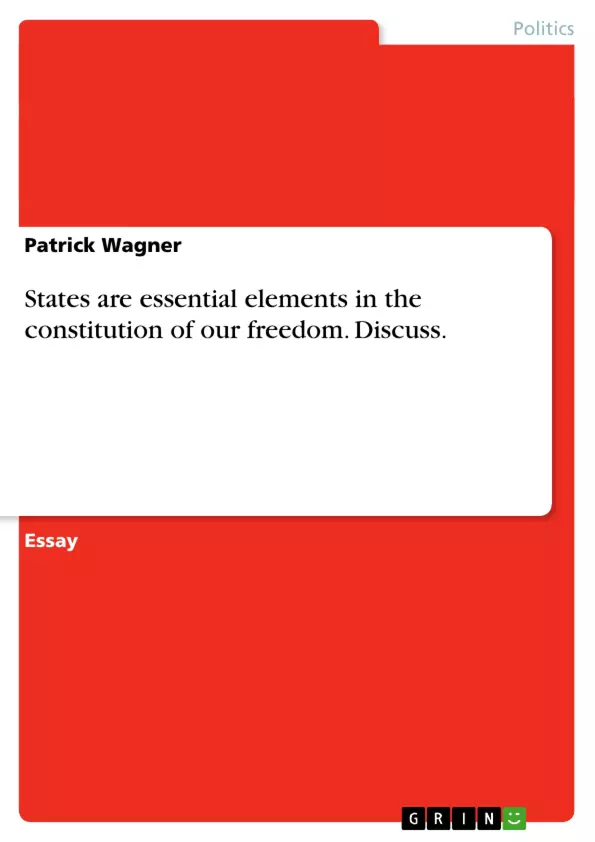The moral standing of states is one of the most essential issues in contemporary international relations. Wars have been fought and lives have been lost in the name of the state. A majority of people seems to value states very highly, or they would not be prepared to give their lives for the protection of the state. Being a member of a state must thus have a number of valuable advantages and generally be regarded as a good thing. But is also evident that not every state will do for every group of people. In the struggle for a state of their own many groups and nations have fought and still fight violent wars . Different states are valued differently by its citizens.
However, the question about the moral standing of states is not a simple one and cannot be answered with reference only to taste and preference. The state is a fundamental concept of the international order since the 17th century and has been internalised by every actor in international relations. An international order without the state is hardly to imagine from a classical point of view. And even critical thinkers have problems explaining what comes after the state, how does the world look like without the state?
The question is, whether states are of any distinct value to us or whether states just stand in the way of our individual freedom. Therefore, this paper shall conclude that the state is an ethically valuable institution. The state might not be a perfect institution, nor is it an ideal solution for everyone everywhere , but it seems there is no real alternative to the state. Even critical thinkers have not been able to find a satisfactory description of how our world would look like without states.
Inhaltsverzeichnis (Table of Contents)
- Introduction
- Views on the State
- Far Right and Far Left
- Liberals
- Communitarians
- Cosmopolitans
- The State and Citizenship
- Development of Citizenship Rights
- Exclusivity of Citizenship
- Rights of Citizenship
Zielsetzung und Themenschwerpunkte (Objectives and Key Themes)
This essay examines the ethical value of the state in international relations, focusing on the relationship between individual freedom and state authority. It aims to demonstrate that despite its imperfections, the state remains an ethically valuable institution, essential for both protecting individual rights and facilitating a functioning international order.
- The moral standing of states in international relations
- The relationship between individual freedom and state authority
- The role of the state in protecting individual rights and promoting social welfare
- The concept of citizenship and its implications for individual identity and political participation
- The potential for cosmopolitanism and the expansion of citizenship rights to a global level
Zusammenfassung der Kapitel (Chapter Summaries)
The essay begins by exploring the diverse views on the state held by different political schools of thought. It examines the perspectives of the far right, far left (Marxism), liberals, communitarians, and cosmopolitans, highlighting their differing opinions on the state's ethical value and its impact on individual freedom.
The essay then delves into the concept of citizenship, arguing that membership in a state provides individuals with a range of rights and protections that extend beyond those available in civil society. It analyzes the development of citizenship rights throughout history, focusing on the evolution from civil rights to political rights and social rights.
The essay further explores the exclusivity of citizenship, noting that while most people today hold membership in a state, not everyone can hold citizenship of their choice. This section discusses the challenges faced by immigrants and the limitations on their access to citizenship.
Schlüsselwörter (Keywords)
Key terms and concepts explored in this essay include: individual freedom, state authority, ethical value, citizenship, civil rights, political rights, social rights, cosmopolitanism, international order, state of nature, exploitation, and the Westphalian state.
Frequently Asked Questions
Are states essential for individual freedom?
Yes, the essay argues that states are ethically valuable institutions that provide the necessary legal and social framework to protect individual rights and maintain international order.
What are the different political views on state authority?
The text examines perspectives from the far right, far left (Marxism), liberals, communitarians, and cosmopolitans, each offering unique interpretations of the state's moral value.
How do citizenship rights evolve?
Citizenship rights typically develop in stages: from basic civil rights to political rights (voting) and finally social rights (welfare and protection).
What is the ethical challenge of citizenship exclusivity?
The exclusivity of citizenship means that while it provides protection for members, it often creates barriers for immigrants and non-citizens who lack access to the same rights.
Is there a viable alternative to the Westphalian state?
Despite criticisms, the essay concludes that even critical thinkers have struggled to describe a satisfactory alternative that could replace the state's role in the current international order.
- Quote paper
- Patrick Wagner (Author), 2002, States are essential elements in the constitution of our freedom. Discuss., Munich, GRIN Verlag, https://www.grin.com/document/18954



